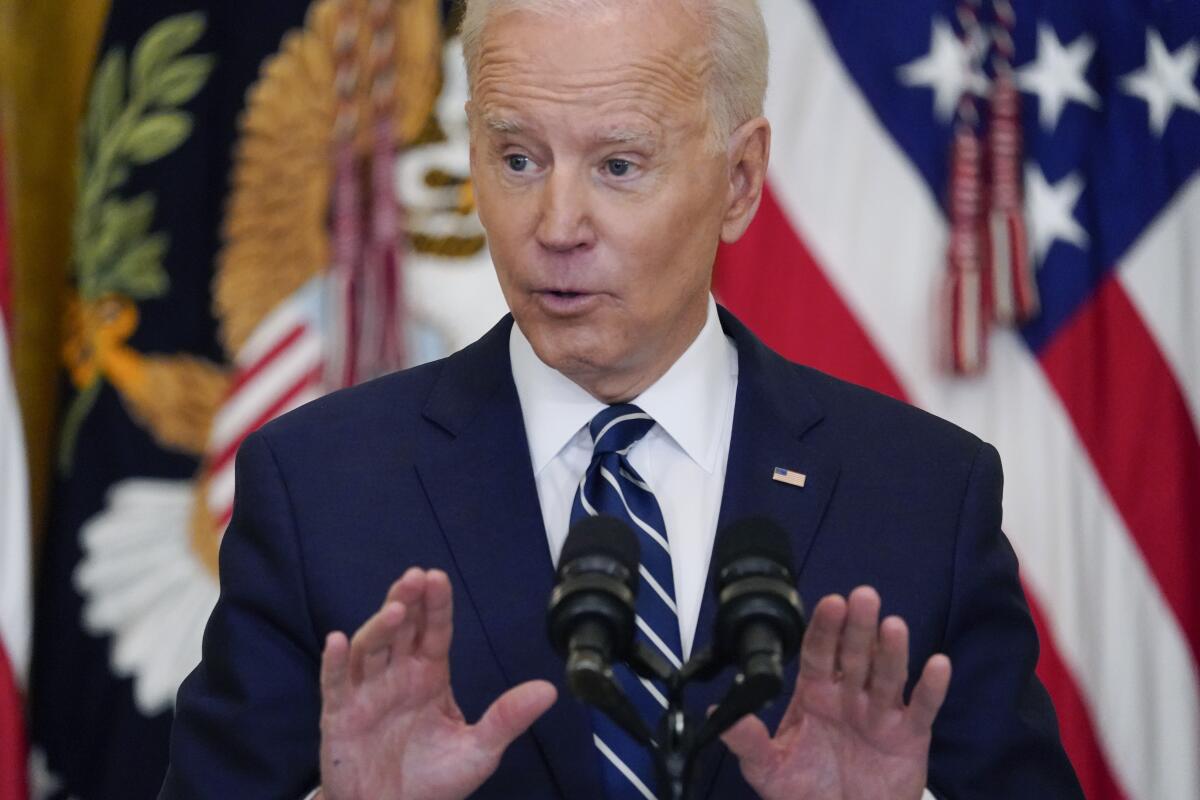Opinion: Biden just wobbled on the filibuster, but he didn’t fall down

If you were looking for clarity about President Biden’s position on the Senate filibuster — liberal Democrats’ No. 1 Enemy at the moment — you didn’t get it at Thursday’s news conference, Biden’s first as president.
Biden was a vocal supporter of the filibuster rule when he was a lawmaker. Since then, he’s become more elusive, often avoiding comment on the issue during the campaign or hedging his bets.
On Thursday he was all over the map.
The president started by saying he’d like to return to the way things were done when he was first elected to the Senate “120 years ago” — a joke delivered in such a deadpan manner, Twitter lit up with Republicans pouncing on what they thought was a gaffe. Biden went on to explain that the filibuster used to visit the upper chamber far less frequently — between 1917 and 1971, the Senate averaged about one motion to cut off debate per year, Biden said; in 2020 alone, there were 118 cloture motions.
“It’s being abused in a gigantic way,” he said, stating the obvious.
In the year Biden cited, it was Democrats deploying the filibuster in a largely vain effort to block Republican actions — mainly on nominations, where the threshold to kill a filibuster is only 51 votes. Fewer than a dozen filibusters actually succeeded last year.
And that may explain why Republicans aren’t so hot and bothered by the filibuster. If your main goal while in power is to confirm judges (where it takes only 51 votes to end a filibuster) while cutting tax rates and slashing entitlements (which is done through budget bills that cannot be filibustered), and to play defense against new governmental programs when you’re out of power (which typically would be subject to a filibuster), there isn’t much reason to change a system that has little to no effect on your agenda
So what’s Biden’s preferred solution?
As of Thursday it was a return to the “talking filibuster,” when opponents of a bill could only hold the Senate floor by giving endless speeches. “People got tired of talking and tired of collapsing,” Biden said. “We were able to break the filibuster, get a quorum and vote. So I strongly support moving in that direction.”
In reality, though, the talking filibuster bears little resemblance to the cinematic version in “Mr. Smith Goes to Washington” — or in Biden’s depiction of last century’s Senate. Under Senate rules, senators cannot vote until every member who wants to debate gets his or her chance, up to two times per legislative day. A handful of senators can’t sustain a filibuster for long, but 41 or more united in opposition can keep the talkfest going forever.
Perhaps recognizing how little his proposed solution would actually solve, Biden went on to say that he was keeping an open mind “about dealing with certain things that are just elemental to the functioning of our democracy, like the right to vote, like the basic right to vote.” Some Democrats have suggested that just as the Senate has set a 51-vote threshold for ending debate on presidential nominees, it should do so for selected types of legislation — such as voting and civil rights measures.
And then the president went considerably further, saying, “If we have to, if there’s complete lockdown and chaos as a consequence of the filibuster, then we’ll have to go beyond what I’m talking about.” Later, he said he agreed with President Obama’s characterization of the filibuster as a relic of the Jim Crow era — a proverbial shot across the bow.
Before anti-filibuster forces get too excited, though, Biden gave plenty of hints that he’s still looking for a middle ground — something that preserves the filibuster, but returns it to the bin of rarely used tools. For instance, he insisted that “there’s a lot we can do while we’re talking about what we’re gonna do about the filibuster.”
Later, explaining why he wouldn’t just seek to abolish the filibuster as a legacy of segregation, he said, “Successful electoral politics is the art of the possible. Let’s figure out how we can get this done and move the direction of significantly changing the abuse of even the filibuster rule, first.... Let’s deal with the abuse first.”
CNN’s Kaitlan Collins sought to pin him down, asking, “It sounds like you’re moving closer to eliminating the filibuster. Is that correct?
“I answered your question,” he replied.
But no, he didn’t.
More to Read
A cure for the common opinion
Get thought-provoking perspectives with our weekly newsletter.
You may occasionally receive promotional content from the Los Angeles Times.











